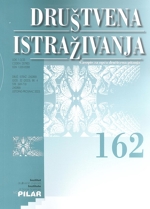FRIENDS-AND-NEIGHBOURS EFEKT NA PARLAMENTARNIM IZBORIMA 2020. U HRVATSKOJ
FRIENDS-AND-NEIGHBOURS EFFECT AT THE 2020 PARLIAMENTARY ELECTIONS IN CROATIA
Author(s): Mislav Stjepan Čagalj, Branimir VUKOSAV, Denis RadošSubject(s): Governance, Electoral systems, Geopolitics
Published by: Institut društvenih znanosti Ivo Pilar
Keywords: geography of elections; friends-and-neighbours effect; regression analysis; Croatia; parliamentary elections;
Summary/Abstract: The candidacy of prominent local political leaders in parliamentary elections is a common strategy by which parties and independent lists strive to achieve the best possible election results. A number of studies indicate the phenomenon of stronger voter support for candidates in a place or area where they are actually from, as well as in neighbouring areas. The mentioned phenomenon in the geography of elections is known as friends-and-neighbours (F&N) effect. Regression analysis was used to explain spatial distribution of the results of the parliamentary elections in the Republic of Croatia in 2020. The results of the regression models, among other things, demonstrated that voter preferences are not reflected exclusively through the prism of preferential votes, but also through increased electoral support for parties and independent lists that nominate local leaders. The so-called F&N effect is generally more noticeable in smaller municipalities.
Journal: Društvena istraživanja - Časopis za opća društvena pitanja
- Issue Year: 32/2023
- Issue No: 4
- Page Range: 657-671
- Page Count: 20
- Language: Croatian

